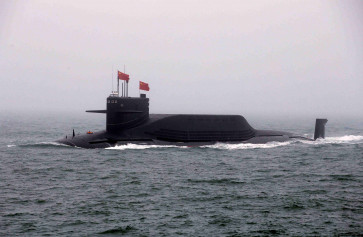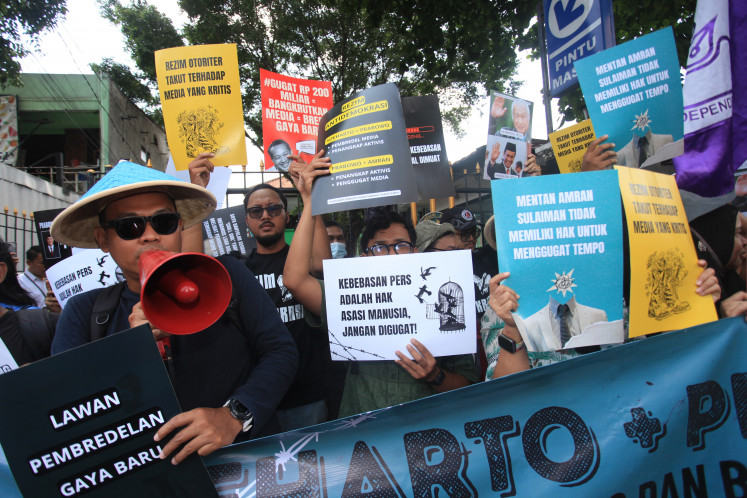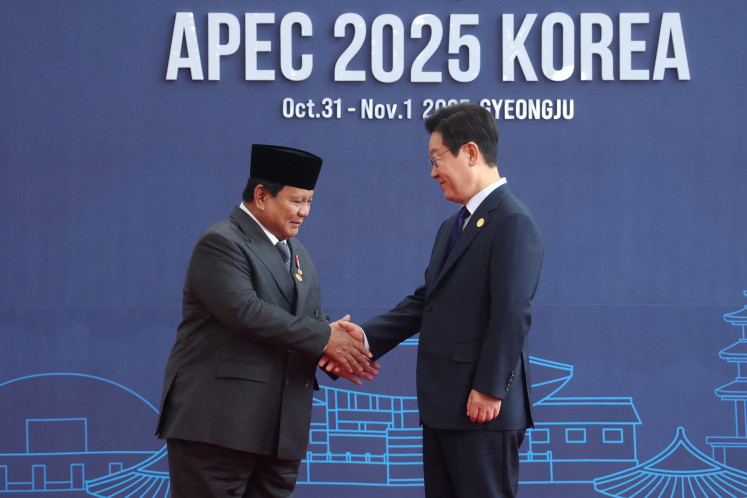Popular Reads
Top Results
Can't find what you're looking for?
View all search resultsPopular Reads
Top Results
Can't find what you're looking for?
View all search resultsCommentary: Sukhoi procurement: Between urgency and transparency
Citizens have been monitoring with caution — perhaps many with confusion — the ongoing discussion in the national media over the procurement of six Russian-made Sukhoi Su-30 MKK fighter jets that are slated for delivery in July
Change text size
Gift Premium Articles
to Anyone
C
itizens have been monitoring with caution — perhaps many with confusion — the ongoing discussion in the national media over the procurement of six Russian-made Sukhoi Su-30 MKK fighter jets that are slated for delivery in July.
The procurement itself has been controversial from the beginning, with limited information available on the technical specifications of the multi-role strike fighter that the Russians have offered and the eventual specification that we had ordered as well as the complicated dealing process that had apparently gone against the principles of transparency on the part of the Indonesian government as the purchaser.
The current procurement — six Su-30 MKK fighter jets worth US$470 million — is a continuation of an earlier procurement of 10 Su-27 and Su-30 MK fighter jets, which was initiated by then president Megawati Soekarnoputri in the wake of the US-imposed embargo on military equipment and training in the late 1990s, and continued by incumbent President Susilo Bambang Yudhoyono. Four units were procured during Megawati’s presidency in 2003 and the remaining six during her successor’s term in 2009.
It was lawmaker Tubagus Hasanuddin, deputy chairman of the House of Representatives’ Commission I on defense, foreign affairs and information, who had revealed the alleged markups in the ongoing procurement of the Su-30 MKK. According to the website of Russia’s state-run JSC Rosoboronexport, the only company that is authorized to export Russian defense products, one Su-30 MKK is worth between $60-70 million depending on the technical specification of the fighter jet that one country requires and orders.
“However, the government has spent $470 million on six planes, or about $78.33 million each,” said Hasanuddin, who was military secretary to Megawati during her presidency.
Defense Minister Purnomo Yusgiantoro has dismissed the allegation, saying that everything related to the procurement had been conducted according to the proper procedures. “There were in fact price differences caused by inflation and other things. But I believe the price differences were not that much,” Purnomo said.
Perhaps the minister was right regarding the purchase price of the Russian fighter jets. But, the methods used by the government to procure the fighter jets were debatable.
The ongoing procurement is reportedly not using the state credit scheme — also known as the government-to-government scheme — as offered by the Russian government when then Russian president Vladimir Putin made a visit to Indonesia on Sept. 6, 2007. The procurement uses foreign commercial loans (export credit scheme) to pay for the fighter planes’ purchase.
“If the purchase was made according to a government-to-government scheme, the Russian government would provide state loans of up to $1 billion, which would be more efficient financially. Why didn’t the government use such a scheme?” military observer Al Araf told the media recently in reference to the 2007 Russia-Indonesia deal. “Russia’s state loan for the fighters could be up to 15 years with a 5-percent interest rate, while a commercial loan is much shorter, ranging from two to five years with a much higher interest rate.”
With such a foreign commercial loan scheme and non-transparent dealing process, it is widely feared that the purchase deal involved a broker, which could cost the state up to 15 percent of the total purchase value in additional fees.
And such a high percentage of fees runs counter to the government’s own commitment to fighting uncontrollable mark-ups in arms procurement. Prior to Yudhoyono’s administration, sales commissions for top Indonesian Military (TNI) officials, dealers and high-ranking civil officials could be as high as 40 percent of the total procurement budget, according to former defense minister Juwono Sudarsono, who served between 2004 and 2009.
“We can only reduce procurement markups at the Defense Ministry, the TNI and the chiefs-of-staff headquarters, but we cannot eliminate them entirely,” Juwono said. “I warned all chiefs of staff [during my term as defense minister] that I could tolerate ‘market price’ fees for arms procurements — say between 8 and 10 percent commission — but I would not tolerate 30 to 40 percent markups as in the past.”
It is also true that such a government-to-government scheme is much more difficult and tougher to pursue than an export credit scheme, as the exporting country(ies) would require Indonesia (the purchasing country) to comply with the terms and regulations that they had established.
But to claim that such a government-to-government loan scheme is completely impossible is not true either as there had been such government-to-government agreements made between Indonesia and Russia on the purchase of a number of military items, such as the procurement of Mi-17-V5 transport helicopters and Mi-35P attack helicopters.
Apart from the controversial dealing process, the minimum accessible documented deal on the fighter jets’ technical specification is also prone to irregularities. We’ll never know for sure whether the purchase deal would cover all the aircraft’s combat capabilities, such as Pugachev’s Cobra and Kulbit combat maneuvers, and sophisticated flight, radar and navigation systems and instruments.
The purchase of the Su-30 MKK fighter jets is meant to complement our country’s US fighter-dominated Air Force. It will be completely meaningless if the ongoing procurement fails to include all the technological supremacy being offered by the Russian fighter jets. Most of all, it betrays the Indonesian people’s trust, as its purchase is undoubtedly financed by state coffers, which originate from taxpayers’ money.










